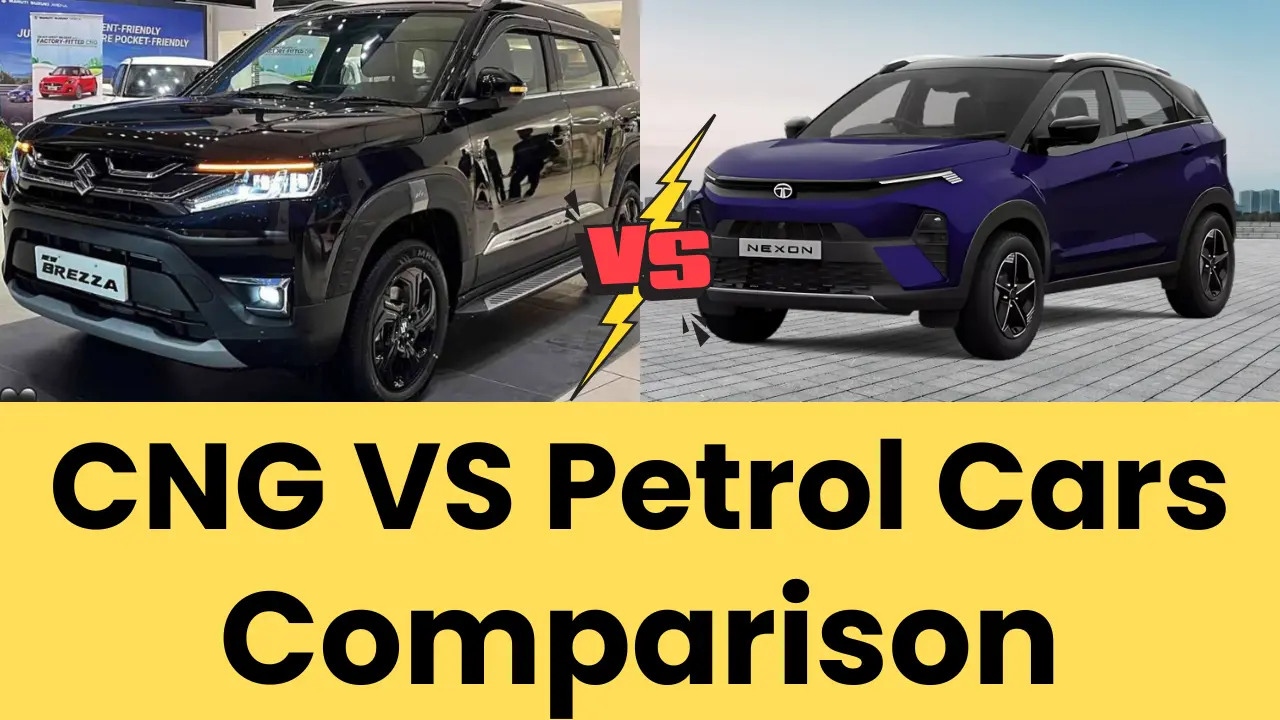When it comes to buying a fuel-efficient and budget-friendly car in India, most buyers face one major question – CNG or Petrol? In 2025, with rising fuel prices, increasing traffic, and growing environmental concerns, this decision is more important than ever. Both options have their pros and cons, and the right choice depends on your driving habits, budget, and long-term plans.
Let’s explore the key differences between CNG and petrol cars, their advantages, disadvantages, and which one might be the better option for you in 2025.
Cost Comparison – Fuel and Maintenance
| Aspect | CNG Cars | Petrol Cars |
|---|---|---|
| Fuel Price (approx.) | ₹75–80/kg | ₹96–105/litre |
| Fuel Efficiency | 25–32 km/kg | 15–20 km/litre |
| Running Cost per km | ₹2.5–3.0/km | ₹5–6/km |
| Maintenance Cost | Slightly higher | Lower |
| Initial Car Price | ₹90,000–₹1.2 lakh higher | Lower base price |
CNG cars offer a significant cost advantage in daily running, especially for those who drive more than 40–50 km daily. However, they come with a higher upfront cost and slightly higher maintenance due to dual-fuel systems and cylinder inspections.
Performance and Driving Experience
Petrol cars are smoother and more responsive compared to CNG cars. Since CNG burns cleaner but has lower energy density, it slightly reduces engine performance. Acceleration and overtaking ability are better in petrol cars, which also perform better on highways and hilly areas.
On the other hand, CNG is ideal for city commuting, where you don’t need aggressive power delivery. Many new CNG cars now come with factory-fitted kits that reduce performance loss and improve engine tuning.
Boot Space and Practicality
Factory-fitted CNG cars are more compact than aftermarket kits, but they still take up considerable boot space. So, if you often travel with luggage or use your car for long trips, a petrol version is more practical.
However, newer cars like the Maruti Brezza CNG or Hyundai Exter CNG offer clever boot management and dual-cylinder setups to minimize space loss.
Safety and Reliability
Modern CNG kits are safe, but they still need regular checks and inspections. Manufacturers like Maruti, Hyundai, and Tata offer strong safety setups for their factory-fitted CNG models. However, avoid aftermarket CNG kits unless installed by certified professionals.
Petrol cars are considered slightly more reliable for long-term use, especially in remote areas where CNG stations and service support may not be easily available.
Availability and Convenience
CNG infrastructure is growing rapidly in metro cities, but in smaller towns and highways, it’s still limited. Petrol, on the other hand, is available everywhere. If your city has plenty of CNG stations and you drive mostly in urban areas, then CNG is a great option.
But if you frequently travel between cities or to rural areas, petrol might be a more convenient and stress-free choice.
Environmental Impact
CNG is a cleaner fuel compared to petrol. It produces lower CO2, NOx, and particulate emissions, making it more eco-friendly. If reducing your carbon footprint matters to you, choosing CNG is the better option in 2025.
Pros and Cons at a Glance
CNG Cars
Pros: Lower running cost, cleaner emissions, ideal for city use
Cons: Less boot space, slightly reduced performance, limited fuel stations
Petrol Cars
Pros: Better performance, easier availability, lower upfront cost
Cons: Higher running cost, more pollution, not as economical for daily long drives
Which One Should You Choose in 2025?
Choose CNG if
You drive more than 40 km/day regularly
You live in a metro or tier-1 city with good CNG station availability
You want low running costs and don’t mind a bit of boot space compromise
Choose Petrol if
You want better highway performance
You drive occasionally or under 30 km/day
You live in a town or rural area where CNG stations are scarce
Final Verdict
Both CNG and petrol cars have their own strengths in 2025. CNG is the king of fuel savings, perfect for high-mileage city drivers. Petrol offers simplicity, smoother driving, and better accessibility. Ultimately, your usage pattern, location, and comfort level with each fuel type should decide your purchase.
If you’re looking for a future-ready, eco-conscious, and cost-effective ride, CNG makes a lot of sense. But for all-round flexibility and performance, petrol still holds its ground.

